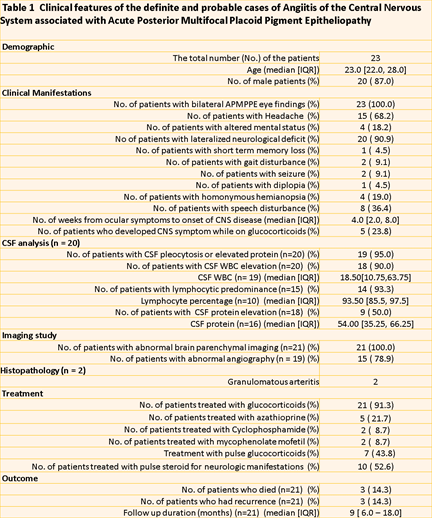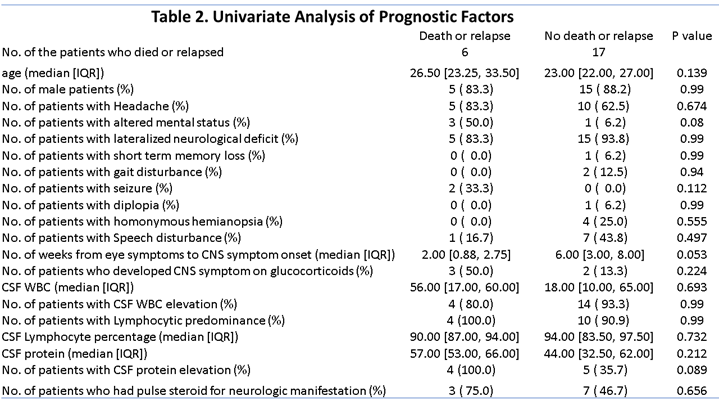Session Information
Session Type: ACR Poster Session C
Session Time: 9:00AM-11:00AM
Background/Purpose:
Acute posterior Multifocal Placoid Pigment Epitheliopathy (APMPPE) is a rare inflammatory eye disease and some appear to develop central nervous system vasculitis (CNSV). This entity is poorly described in the medical literature and little is known about treatment and prognostic factors.
Methods:
We present a case series of 23 patients with CNSV in association with APMPPE; 21 cases have been reported in the literature in addition to our experience with two cases. Patients were identified after a systemic literature search using Pubmed and Scopus for key words including APMPPE, stroke, neurological and CNSV. The cases were classified into definite (confirmed by pathology) or probable (inflammatory cerebrospinal fluid (CSF), imaging evidence of stroke/vasculopathy, and/or steroid response).The clinical features were described.
Results:
Total 23 articles and 24 articles were found in pubmed and scoupus respectively. Total 54 cases were described in these articles. Two cases met the criteria for definitive case and 19 cases met the criteria for probable case. Total 23 cases were analyzed after adding our two cases. The clinical features of these patients were summarized in table 1.
Thirteen patients treated only with glucocorticoids (GC) resulted in 2 deaths and 2 relapses. One of these two relapses was treated with cyclophosphamide (CYC) with improvement. One patient received GC and CYC with improvement, however, a relapse occurred after switching to azathioprine (Aza). The other 4 patients who received GC and Aza improved without relapse or death. Two patients were treated with GC and MMF without relapse or death. One patient was treated with GC and mitotoxin successfully. Two patients without any treatment resulted in one death. Two patients without any treatment resulted in one death. The prognostic factors were compared (Table 2).
The death and relapse free survival curve of the entire cohort was also drawn (Figure 1).
Conclusion:
The treatment outcome varies widely among the patients. No clinical variables can predict relapse or death. The longer duration from an onset of eye symptoms to CNS disease may have a better prognosis, although this did not reach statistical significance. We successfully treated CNS vasculitis with MMF and MMF can be used to treat this severe complication of APMPPE.
To cite this abstract in AMA style:
Tamaki H, Hajj-Ali RA. Clinical Features and Treatment of Central Nervous System Vasculitis Associated with Acute Posterior Multifocal Placoid Pigment Epitheliopathy [abstract]. Arthritis Rheumatol. 2017; 69 (suppl 10). https://acrabstracts.org/abstract/clinical-features-and-treatment-of-central-nervous-system-vasculitis-associated-with-acute-posterior-multifocal-placoid-pigment-epitheliopathy/. Accessed .« Back to 2017 ACR/ARHP Annual Meeting
ACR Meeting Abstracts - https://acrabstracts.org/abstract/clinical-features-and-treatment-of-central-nervous-system-vasculitis-associated-with-acute-posterior-multifocal-placoid-pigment-epitheliopathy/



